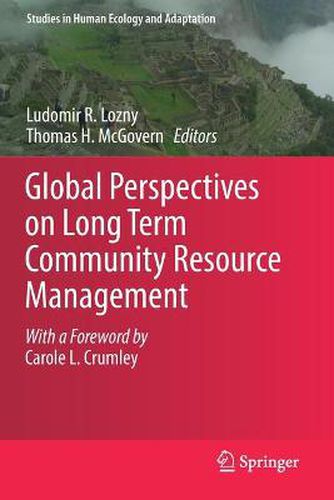Global Perspectives on Long Term Community Resource Management

Global Perspectives on Long Term Community Resource Management
This title is printed to order. This book may have been self-published. If so, we cannot guarantee the quality of the content. In the main most books will have gone through the editing process however some may not. We therefore suggest that you be aware of this before ordering this book. If in doubt check either the author or publisher’s details as we are unable to accept any returns unless they are faulty. Please contact us if you have any questions.
Communal-level resource management successes and failures comprise complex interactions that involve local, regional, and (increasingly) global scale political, economic, and environmental changes, shown to have recurring patterns and trajectories. The human past provides examples of long-term millennial and century-scale successes followed by undesired transitions ( collapse ), and rapid failure of collaborative management cooperation on the decadal scale. Management of scarce resources and common properties presents a critical challenge for planners attempting to avoid the tragedy of the commons in this century. Here, anthropologists, human ecologists, archaeologists, and environmental scientists discuss strategies for social well-being in the context of diminishing resources and increasing competition.
The contributors in this volume revisit tragedy of the commons (also referred to as drama or comedy of the commons) and examine new data and theories to mitigate pressures and devise models for sustainable communal welfare and development. They present twelve archaeological, historic, and ethnographic cases of user-managed resources to demonstrate that very basic community-level participatory governance can be a successful strategy to manage short-term risk and benefits. The book connects past-present-future by presenting geographically and chronologically spaced out examples of communal-level governance strategies, and overviews of the current cutting-edge research. The lesson we learn from studying past responses to various ecological stresses is that we must not wait for a disaster to happen to react, but must react to mitigate conditions for emerging disasters.
This item is not currently in-stock. It can be ordered online and is expected to ship in 7-14 days
Our stock data is updated periodically, and availability may change throughout the day for in-demand items. Please call the relevant shop for the most current stock information. Prices are subject to change without notice.
Sign in or become a Readings Member to add this title to a wishlist.


